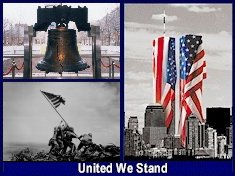I’ve been pondering this thought: would it have made any difference to NATO lend-lease agreements with Ukraine if Obama had not scuttled the planned missile defense system to be deployed in Poland? Certainly sea-based and fixed locations couldn’t be sent over to Ukraine, but what about mobile launchers – and the missiles themselves?
 Alan K. Henderson
Alan K. Henderson
Why Johnny Doesn’t Want to Read
The other day Instapundit linked an article on the role of public school reading assignments in discouraging boys from taking up reading for pleasure. The subject is familiar to anyone to anyone who read Christina Hoff Sommers’ book on the subject. In short, K-12 reading assignments don’t match up with boys’ interests. Boys prefer activity-oriented plot-based stories, schools gravitate toward girls’ interests – quoting Sommers, “[p]ersonal narratives full of emotion and self-disclosure.” I’ll have more to say on that later.
This has me waxing (mostly unpleasantly) nostalgic about my own school-age reading assignments. The earliest one I can recall is of A Tale of Two Cities. I remember scarcely anything about London and a few highlights about Paris. Shakespeare is something I could take only in small doses due to the language barrier. I liked the plot synopses and some of the more memorable passages such as Polonius’ advice to Laertes (someone should CGI W. C. Fields into the role of Polonius). One junior high class assigned two entertaining movie scripts – Colossus: The Forbin Project and Escape from the Planet of the Apes. At home my literary gateway to the world was World Book Encyclopedia; I especially loved the maps and the articles on foreign locales and peoples and exotic animals. I did not grow up reading novels or even comic books. In my late teens I tried reading my mom’s Agatha Christie novels, but for some reason I couldn’t quite get into them.
High school offered (ahem) textbook examples of what’s wrong with school reading assignments. I have finally gotten around to posting Amazon reviews for the three high school reading assignments that turned me off to reading.
Odes to Liberty
Playing fast and loose with the definition of “ode,” this was an annual Independence Day tradition on the long-neglected blog. The original was posted July 4, 2002. Most years a change or addition was made. This is the most recent incarnation.
Scenes from “John Adams” showing the meeting of the Second Continental Congress, at which the vote for independence from Great Britain is conducted, and the public reading of the Declaration of Independence. [Original video with both scenes is now a dead link, new videos have been found.]
The Declaration formally proclaimed our independence – the Battle of Yorktown won it.
 Through these fields of destruction
Through these fields of destruction
Baptisms of fire
I’ve watched all your suffering
As the battle raged higher
And though they did hurt me so bad
In the fear and alarm
You did not desert me
My brothers in arms
Dire Straits, “Brothers in Arms”
“Then I will live in Montana, and I will marry a round American woman and raise rabbits and she will cook them for me. And I will have a pickup truck, or possibly even a recreational vehicle, and drive from state to state. Do they let you do that?”
Vasili Borodin (played by Sam Neill), The Hunt for Red October
“‘We hold these truths to be self-evident… That all men are created equal, that they are endowed by their Creator with certain inalienable rights… That among these are Life, Liberty and the Pursuit of Happiness… That to secure these rights, governments are instituted among men …’. And this paper that from the French Revolution on the whole West has copied, from which each of us has drawn inspiration, still constitutes the backbone of America. Her vital lymph. Know why? Because it transforms the subjects into citizens. Because it turns the plebes into people. Because it invites, no, it orders the plebes turned into citizens to rebel against tyranny and to govern themselves. To express their individualities, to search for their own happiness. (Something that for the poor, for the plebes, means to get rich). The exact contrary, in short, of what the communists used to do with their practice of forbidding people to govern themselves, to express themselves, to get rich. With their practice of installing His Majesty the State on the throne.”
Oriana Fallaci, The Rage and the Pride
“With this faith we will be able to transform the jangling discords of our nation into a beautiful symphony of brotherhood.”
Martin Luther King
“There is an inverse relationship between reliance on the state and self-reliance.”
“The State exists simply to promote and to protect the ordinary happiness of human beings in this life. A husband and wife chatting over a fire, a couple of friends having a game of darts in a pub, a man reading a book in his own room or digging in his own garden – that is what the State is there for. And unless they are helping to increase and prolong and protect such moments, all the laws, parliaments, armies, courts, police, economics, etc., are simply a waste of time.”
C. S. Lewis, Mere Christianity
 “Funny that the same people to whom diversity is a holy word so often bemoan diversity of opinion as divisive. But in a democracy, politics are naturally divisive: you vote for this candidate and someone else votes for that one; you vote yes (or no) on a proposition and other citizens disagree. What’s not divisive? Saddam and his 99.96% of the vote. That’s how it went during the previous Iraqi election — an illustration of the Latin roots of the word fascism, which actually means a bunch of sticks all tied together in one big unhappy unified bunch, and not (despite what many assume) any variation from p.c. received-wisdom regarding gay rights, affirmative action, bilingual education, etc. This election was different because it was divisive, which means it was better.”
“Funny that the same people to whom diversity is a holy word so often bemoan diversity of opinion as divisive. But in a democracy, politics are naturally divisive: you vote for this candidate and someone else votes for that one; you vote yes (or no) on a proposition and other citizens disagree. What’s not divisive? Saddam and his 99.96% of the vote. That’s how it went during the previous Iraqi election — an illustration of the Latin roots of the word fascism, which actually means a bunch of sticks all tied together in one big unhappy unified bunch, and not (despite what many assume) any variation from p.c. received-wisdom regarding gay rights, affirmative action, bilingual education, etc. This election was different because it was divisive, which means it was better.”
Cathy Seipp (Samizdata quote of the day, February 01, 2005)
“It’s all wrong. By rights we shouldn’t even be here. But we are. It’s like in the great stories, Mr. Frodo. The ones that really mattered. Full of darkness and danger they were. And sometimes you didn’t want to know the end. Because how could the end be happy? How could the world go back to the way it was when so much bad had happened. But in the end, it’s only a passing thing, this shadow. Even darkness must pass. A new day will come. And when the sun shines it will shine out the clearer. Those were the stories that stayed with you. That meant something. Even if you were too small to understand why. But I think, Mr. Frodo, I do understand. I know now. Folk in those stories had lots of chances of turning back only they didn’t. Because they were holding on to something…That there’s some good in this world, Mr. Frodo. And it’s worth fighting for.”
Sam Gamgee (played by Sean Astin), Lord Of The Rings: The Two Towers
“[W]e recognize that we are living in the middle of the most overwhelmingly successful experiment in human history. Not perfect. Just the best place in the world to live in, that’s all.”
“I will not be pushed, filed, stamped, indexed, briefed, debriefed or numbered! My life is my own.”
Number Six (played by Patrick McGoohan, “The Prisoner” TV series)
“Patriotism means to stand by the country. It does not mean to stand by the President or any other public official save exactly to the degree in which he himself stands by the country. It is patriotic to support him insofar as he efficiently serves the country. It is unpatriotic not to oppose him to the exact extent that by inefficiency or otherwise he fails in his duty to stand by the country.”
Theodore Roosevelt
This Tea Party protest sign illustrates Roosevelt’s musings on patriotism – and the powers of the citizen as exercised via the ballot box:
“So this Jefferson dude was like, ‘Look, the reason we left this England place is ’cause it was so bogus. So if we don’t get some primo rules ourselves – pronto – then we’re just gonna be bogus, too.”
Jeff Spiccoli (played by Sean Penn), Fast Times at Ridgemont High
“Democracy extends the sphere of individual freedom, socialism restricts it. Democracy attaches all possible value to each man; socialism makes each man a mere agent, a mere number. Democracy and socialism have nothing in common but one word: equality. But notice the difference: while democracy seeks equality in liberty, socialism seeks equality in restraint and servitude.”
Alexis deTocqueville, Democracy in America Vol. 2
“We who lived in concentration camps can remember the men who walked through the huts comforting others, giving away their last piece of bread. They may have been few in number, but they offer sufficient proof that everything can be taken from a man but one thing: the last of the human freedoms — to choose one’s attitude in any given set of circumstances, to choose one’s own way”
Viktor Frankl, Man’s Search for Ultimate Meaning
Takin’ Care of Business
Months ago in a Facebook comment thread populated by those sorts who glorify trade unionism, I conjured the following scenario: in an office setting, employees show up to work one day and find that some sort of Rapture has whisked away the world’s managers. Focusing on one single company, what are the repercussions? The responses were unanimous: nothing would change, the workers would continue to do their jobs. This illustrates a prejudice common to the left and foundational to Marxism, the notion that managers don’t really do anything.
One of my chief criticisms of public education is that it neglects to teach the workings of the business world in general. This was evident even before the ’60s counterculture took over the education establishment. I’ve long felt that comprehensive instruction on how various industries function should start at least as early as the beginning of junior high school (which my Protestant self unintentionally coincided with bar mitzvah age).
My initial concern was that too many adolescents grow up with insufficient knowledge of the business world to make rational career choices. Career development should not start with a trip to the guidance counselor’s office in 12th grade, or (like me) with a vague notion that computers are the future so a degree in computer programming should be pursued. (Demonstrating that “career” and “careen” have the same root word, I never worked in programming, and wound up in monitoring an ATM network.) There’s another vital ingredient to finding vocational direction that the classroom setting cannot facilitate: learning and discovering one’s individual talents. That rests on personal relationships.
Aside from benefits to career development, better education about the world of commerce also breaks down misconceptions about managers, other professions, and various types of businesses.
